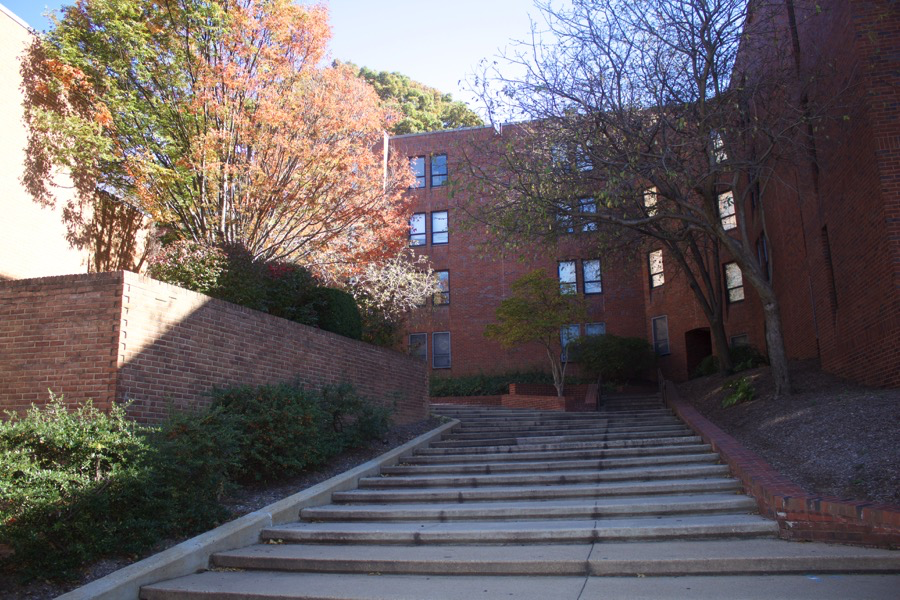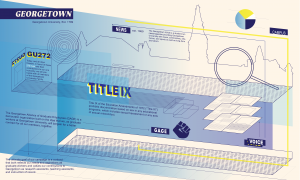Georgetown’s campus, normally the temporary home of over 5,000 undergraduate students, will see less than 500 residents for the Fall 2020 semester.
This number fluctuated through a series of campus plans adapting Georgetown’s normal operating status for a semester defined by the ongoing coronavirus pandemic. Like many universities, Georgetown initially announced a hybrid semester on July 6, offering housing to freshmen, residential assistants (RAs), and a small number of students with extenuating circumstances that made campus housing a necessity.
However, as COVID-19 cases began to rise once more in over half of U.S. states, leading to a self-quarantine order from Mayor Murial Bowser for individuals traveling to D.C. from 27 states, this plan was evidently reconsidered and ultimately altered. On July 29, Georgetown announced the semester would be conducted virtually, and freshmen would no longer be invited to campus unless there was a demonstrated need. Two days later, on July 31, the university informed RAs their position would be suspended, leaving only one of the three groups originally granted housing on campus.
As students began to grapple with the impact of a virtual semester on their education, mental and physical health, and financial stability, frustrations emerged from several groups about their access to on-campus housing. International students reeled from a series of announcements from Immigrations and Customs Enforcement (ICE) that put their status in the country in jeopardy. Transfers, who identify as first-years, wondered why they weren’t initially invited back with the freshmen. And upperclassmen with dangerous home situations, accessibility needs, time-zone barriers, and housing insecurity wondered why their applications for on-campus housing were one of 350 the university rejected.
Five major groups of students (upperclassmen, freshmen, transfer students, international students, RAs) went through rounds of housing applications throughout the month of July, with only approximately 150 students receiving need-based housing initially. As a small number of students prepare to move on campus (the group chat for on-campus housing, while imprecise, now numbers just under 300), and others still scramble for alternative housing, here’s how each of these groups fared, and where you’ll find them this fall.
Upperclassmen
Returning students learned in the initial fall plan they would largely not be able to live on campus or take in-person classes. Citing concerns about keeping the number of students on campus low—concerns which increased as COVID-19 cases grew during the month of July—the initial announcement from University President John DeGioia relayed that only students with serious concerns about their safety or ability to learn in their current home environment could apply to live on campus. Students who had been living on campus through the summer could also remain.
In an email, the following day, Vice President for Student Affairs Todd Olson released the Housing Stability Application, which students had three days to complete. The applications were reviewed by a committee of university staff and administrators and asked students to describe the circumstances they believed made them eligible for housing on campus. Explicitly listed circumstances included housing or food insecurity, safety and security concerns in a current or future living situation, extraordinary living conditions paired with high financial need, internet inaccessibility, and a permanent home address more than five time zones away from the Eastern U.S. time zone. Students could also explain another circumstance that did not neatly fit into a category, and some applied under mental health or accessibility concerns.
On July 14, a day later than the university said decisions would be released, about 150 of the over 500 applications were officially approved. Students who were granted housing largely reported their reasons for applying to the Voice as unstable housing and unsafe home environments. These students have since selected one roommate and on-campus apartments to live in.
Students who were rejected were given 24 hours to appeal but were instructed only to do so if their circumstances had materially changed. The Voice is not aware of any appeals that were approved at that time. Rejected students were not given any additional resources or instructions on how to secure affordable housing. They were provided links to CAPS and Campus Ministry.
Those rejected included a student who had no permanent address in the U.S. and could not return to the country his family was living in due to travel restrictions, a student with narcolepsy who requested housing so they would have a roommate who could ensure they did not have an attack during class, multiple LGBTQ+ students in homophobic home environments, and a student living in India which is 10.5 time zones away from EST during daylight savings.
In response to the number of rejections, which they saw as concerningly high, students in association with GUPride created a form seeking testimonials from those who were rejected and reached out to administrators asking for a continued appeals process.
Though some students who were approved turned down their spots, these spots were not promised to applicants who had previously been rejected, sparking outrage. Following the release of the updated fall plan, students again asked to reapply for on-campus housing given the drastically lower number of students that would be on campus.
Though no official application process exists, students who were previously rejected from on-campus housing whose situations have altered and pose challenges to academic success can appeal via email to fall2020housing@georgetown.edu, according to a university spokesperson.
Some students who appealed to the email, including some whose testimonies were included above, were ultimately granted housing. The Voice is not aware of any students who were denied housing after multiple appeals, though certainly not all initially denied students appealed the decision.
The initial article on upperclassmen housing, including testimonials from rejected students can be found here.
First-years
For 23 days, freshmen believed they would be the main group granted the much-coveted on-campus housing. The initial plan allowed first-years to move into single rooms in residence halls, and attend some classes in-person. First-years who felt uncomfortable returning to campus could choose not to do so and take classes online like upperclassmen.
The prioritization of first-years in the fall plan, which the university justified by arguing “the initial transition to college life and a campus community is critical for framing an academic career at Georgetown,” was heavily criticized, especially as it was seen to prioritize students paying tuition over upperclassmen students in need of housing.
However, first-years learned on July 29, about three weeks before they were slated to move in, that they would in fact not be granted blanket on-campus housing. While they were encouraged to remain at home if possible, like upperclassmen, a new fall Housing Stability Application was opened for first-years. Notably, while the application still includes housing and food insecurity, safety and security of the current living environment, and high financial need mixed with extraordinary living situations as reasons to apply, time zones are no longer listed as a reason for applying.
Applications were due Aug. 5, and the application said the committee aimed to send out decisions by Aug. 7.
Freshmen received decisions by Aug. 11. Though many were granted housing, a few reported they had been rejected after applying and submitting an appeal. Appeals for freshmen are ongoing, though there has not been an outcry about a lack of housing access as there was following the initial upperclassmen decision.
Incoming transfers
Though they consider themselves first-years, incoming transfer students were not included in the group of students allowed to return to campus in the initial fall plan. In response, many transfer students created and circulated a petition asking for increased recognition in the fall planning, including in the housing process.
“Many of us would only have two years at Georgetown, so that means that we’d only have one full year on campus,” Sheila Cruz-Morales (COL ’22), an incoming transfer said. “That definitely takes away from our experience and our identity as Georgetown students.”
The university did not change their policy around bringing transfer students to campus, though a university spokesperson said they were working on other ways to integrate transfers into the community.
Transfer students could apply for on-campus housing using the initial application, and at least a few of their requests were granted. Since freshmen will no longer be invited to campus, the two groups will now see fairly similar fall semesters.
The initial article on transfer students, including testimonials, can be found here.
International students
Perhaps the group with the most uncertainty through July, international students saw a series of updates with unclear implications.
This began with a July 6 announcement from U.S. Immigration and Customs Enforcement (ICE) declaring the F-1 visas of all international students would be revoked if their class load was fully online or their institution was not offering any in-person classes for the Fall 2020 semester. The ruling, which would have impacted over one million international students studying in the U.S., was rolled back on July 14 following a lawsuit filed by Harvard and the Massachusetts Institute of Technology.
Georgetown signed onto an amicus brief in the lawsuit, though they did not announce any concrete plans for how housing would be affected by the new regulations. Panicked, international students applied for housing, citing time differences, an inability to return home, or a threatened visa status, and waited to hear back.
International students who applied for on-campus housing did not hear back at the same time as domestic students and were instead emailed two days later in a separate batch. The rejection email cited the ICE reversal, according to one student who wished to remain anonymous, and did not respond to other concerns of housing insecurity and financial stability. They were not given a chance to appeal.
That student did not know a single international student whose application for housing was accepted.
Felipe Lobo Koerich (SFS ’21), who helped author a petition earlier in the summer asking the university to respond to the needs of international students, said almost all the international students he knew approved to live on campus were ones who never left in the spring. They number between one to two dozen, Lobo Koerich said, based on the group chats he’s seen.
The ICE restrictions are still in place for freshmen international students, which Lobo Koerich says the university is prioritizing for on-campus housing given their threatened visa status.
An article on the concerns of international students can be found here.
RAs
RAs were initially largely invited back to campus with the freshmen. Following the July 6 announcement, they were given the choice to either defer their position until the next academic year or ask to return to campus. The vast majority of those who applied to return were approved to do.
During the month of July, RAs prepared to move in during early August. When the housing application came out, many were explicitly told by their community directors not to apply, as they would be provided housing through their employment. A few disregarded this advice and applied anyway; those who were accepted turned down the offer based on their position as an RA.
When the updated fall plan was released, RAs were initially told the number of RAs on campus would be reduced due to a lower number of residents, but students were under the impression a substantial number of them could still return. Two days later, on July 31, the RA position was terminated. In that email, RAs were told they could only secure on-campus housing if they had already applied (which many of them were explicitly told not to do).
Following outcry from both RAs and GUSA, the university opened the housing application for freshmen to RAs as well. RAs previously granted housing will still have access to it, and no RAs have reported needed housing being denied to the Voice.
A news commentary on the situation of RAs can be found here.





